Did you know that prior to this past weekend The Lion King franchise was already a member of the ultra-exclusive EGOT club? I sure didn't. I just learned about it from a "101 Facts About The Lion King" YouTube video. The "GOT" part of the equation is easy - multiple Grammy's for the original soundtrack, an Oscar for "Can You Feel the Love Tonight?" and Hans Zimmer's original score, and Tonys for Best Musical and Julia Taymor's direction, to go along with four other wins in technical categories. The Emmy is a little trickier to track down considering just how many TV shows Disney has squeezed out of this franchise, but Timon & Pumbaa, a spin-off series which ran from 1995-1999, walked away with three Emmys, including one for Nathan Lane's vocal performance.
There are certainly other ways to quantify The Lion King's cultural reach, like how the original became the highest-grossing hand drawn animated film in history and most-sold film on home video across all platforms (VHS, DVD, Blu-Ray), at least according to the aforementioned "101 Facts" video. Not to mention, Disney made over a billion from Lion King merchandise alone in 1995 and over 100 million people worldwide have seen some production of the musical adaptation since its 1997 Broadway debut. However, the EGOT truly stands out to me. For a single franchise to have conquered TV, music, film, and the stage is a truly amazing accomplishment that speaks to just how far-reaching The Lion King became.
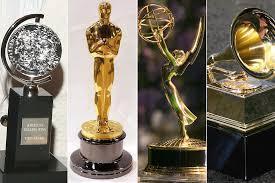
That's why when it came to Jon Favreau's CGI update of the 1994 original no one paid much attention to critics or the #FilmTwitter people forever stuck in their own bubble, a bubble I often occupy with them, to be fair. Everyone already knows what this movie is and those who don't are likely young children with parents more than happy to take them. Plus, what the hell else are you going to watch in theaters right now? Unless you live in a town which has enough screens to spare for something like The Farewell (haven't seen it yet), The Art of Self Defense (highly recommended), or Wild Rose ( highly, highly recommended), The Lion King is the only new movie out at the moment and it's the thing everyone wants to talk about.
Not all of that talk has been positive, of course. A couple of weeks ago, the early word on Twitter after the first Lion King press screenings was not only not good but often quite hostile, with many throwing around phrases like "creatively bankrupt" and "symbolizes everything that's wrong with Hollywood." I hadn't seen a group of cinephiles so enraged in response to a remake since maybe Gus Van Sant's shot-for-shot update of Psycho.
Once the press embargo completely lifted and full reviews could be published, the critical knives were out in full force. A brief sampling from Letterboxd:
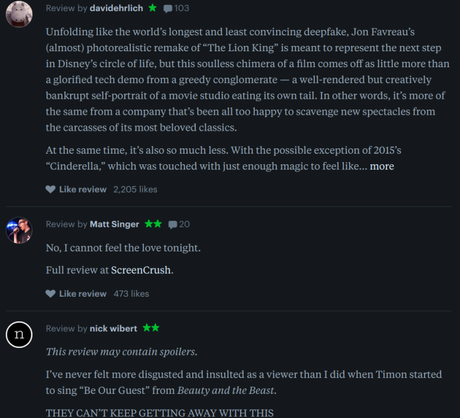
Whatever, as far as Disney is concerned. The movie obliterated box office records galore, including topping The Deathly Hallows, Part 2's prior record for top July opening. Opening night audiences gifted it with a fantastic CinemaScore. In yet another example of the gaping chasm between critical and popular opinion, there is now a nearly 40-point gap between the film's RottenTomatoes critic's rating and audience score. The critical tastemaker's whose opinions are supposed to matter simply did not matter in this particular instance. What chance, really, do a bunch of disgruntled and dismayed critics have against an EGOT-anointed franchise, especially one which just added Beyonce to its cast?
She plays Simba's childhood friend and, spoiler from 1994, eventual mate Nala. Barking her lines like a singer commanding her backup dancers, Beyonce's mostly here to win an Oscar and complete her own personal EGOT with her original song "Spirit," which is one of the only new additions to the film. The song doesn't even get to play in full. Mostly, we hear Beyonce belting out the word "Spirit" over and over again to pseudo-Afro beats while Simba (Donald Glover), Nala, and Zazu (John Oliver at his most John Oliver) traverse gorgeous terrain en route back to Pride Rock. It's not a lot to go off, re: Oscar aspirations, but there's a movie-like music video out there for "Spirit" as well as an entire new album of Beyonce songs inspired by the movie.
Everything about that - Beyonce is in it, contributed a new song, and made a whole companion album of originals - adds to this intense curiosity factor surrounding this movie:
It's an update of something everyone already kind of knows even if they never actually saw the original film. It features an insanely pedigreed vocal cast, with James Earl Jones (Moufasa, again), Chiwetel Ejiofar (Scar), Billy Eichner (Timba), Seth Rogen (Pumbaa), Alfre Woodward (Sarabi), John Kani (Rafiki), and Keegan Michael-Key and Eric Andre (as two of the hyenas) joining Glover, Beyonce, and Oliver. Moreover, there are exactly zero human characters and zero shots of live-action environments. It's 100% CGI filled with photorealistic imagery sure to fool most audiences.

Like Avatar before it, this new Lion King represents a new step forward in film technology that has to be seen to be believed. It takes everything Jon Favreau and Disney learned o n their prior experiment in this arena, The Jungle Book, and advances and perfects it in a movie so stunning you'd swear it was a Planet Earth episode if you didn't know any better, although surely the talking animals gives it away.
However, as many of the critics have pointed out there is an inherent strangeness to much of this visual accomplishment. Pumbaa the cartoon character, for example, is a charming, even cute little guy you can easily see buying as a stuffed animal; Pumbaa, the photo-realistic warthog who sounds like Seth Rogen and sings "Hakuna Matata" is kind of off-putting. An animal that bereft of visual charm does not so easily come off as a funny little Disney sidekick.
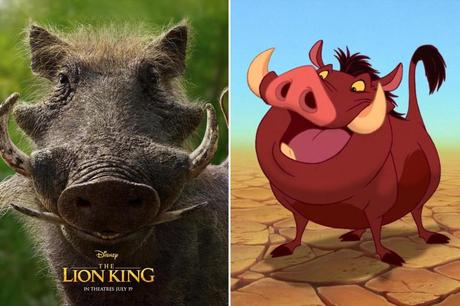
Similarly, sequences which worked beautifully, such as Scar's clifftop betrayal of Moufasa or Timon showing Simba how to eat insects, in the animated realm come off as awkward when re-enacted with photo realistic animals.
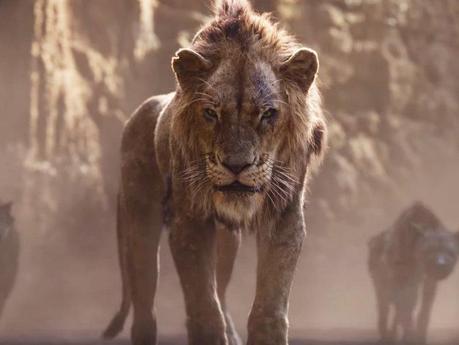
But this is The Lion King we're talking about. It has an EGOT! The story works and plays well with audiences, even if some might still argue that Simba's hero's journey isn't much of an actual journey - pride and youthful arrogance leads to humbling/devastating tragedy leads to a young adulthood of extreme leisure leads to a reclaiming of his throne because his ghost dad tells him to. Is that a satisfying character arc? People have argued about that for decades, and if ever there was a time to add more to Simba's character and maybe also significantly update Nala's screen time it would be now.
However, that's not what Jon Favreau and Disney wanted to do. Their goal, clearly, was to give everyone the story they already know in a way they've never seen before (with, in a nod toward 2019 diversity, a vocal cast of primarily African-American actors). If the original Lion King could marry a loose version of Hamlet with African animals to groundbreaking visuals blending hand-drawn animation with SFX, why can't they port that same old story to another technological breakthrough?
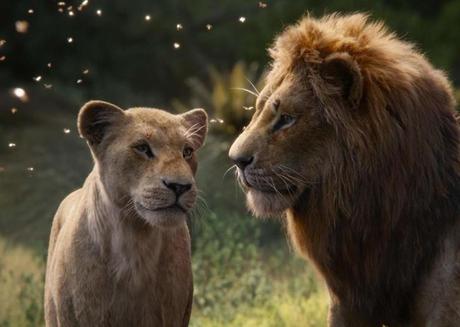
To the critics, that is the definition of creative negligence, a "them's fightin' words" failure to justify why a new version of this movie needs to exist. To audiences, it's an excuse for nostalgia, a way to turn your kids on to a beloved classic in a format they'll like, and two hours of movie magic where you'll happily get lost in the wonder of "if animals could talk." And to exhibitors around the world, they're just happy when anything has enough cultural power to actually get people out of their homes and into movie theaters.
Personally, I found myself on the side of the critics for the first half of the film, but as the story progressed and my eyes adjusted to the visuals I simply gave in to the familiar, but fun joys of the story. Eichner and Rogen, in particular, deliver delightful vocal performances, and Favreau pads the run-time with sweeping vistas and extended nature sequences which never fail to stun, though did we really need to see a beetle rolling a literal ball of giraffe shit down a hill? It's also far harder to tell the animals apart during fight scenes when they're photo-realistic and not hand-drawn to feature contrasting colors, but if this is what movies are now at least it's nice or interesting to look at.
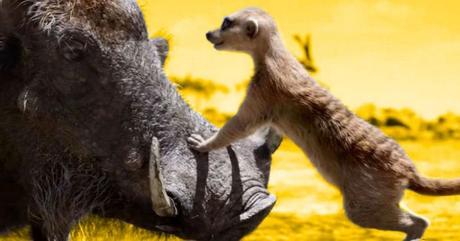
I found myself thinking back to something Joe Bob Briggs recently said about how the film industry is entering into a new Broadway phase where, like all those old classic musicals which get revived every couple of decades, we're simply going to keep getting the same old thing cycling back through because they've been proven to work in the past. However, not every Broadway revival or movie remake is built the same. Some are completely faithful, some are radical reinventions, and some are stuck in-between.
On that spectrum, this new Lion King would clearly be classified as "faithful," and like the 100 million people who have happily paid to see the stage musical there are clearly scores of people around the world willing to pay for a flawed, but faithful revival of the film featuring new visuals and cast members. You can despair for what this means for Hollywood's artistic soul, but who are we kidding here? Want art? Stream the latest 6-hour-movie-posing-as-a-streaming-show. Want mass entertainment? Disney's just about the last game in town, and even with some reservations and criticisms I ultimately enjoyed this new Lion King, warts, warthog and all.
What about you? Let me know in the comments.
Grew up obsessing over movies and TV shows. Worked in a video store. Minored in film at college because my college didn't offer a film major. Worked in academia for a while. Have been freelance writing and running this blog since 2013. View all posts by Kelly Konda

